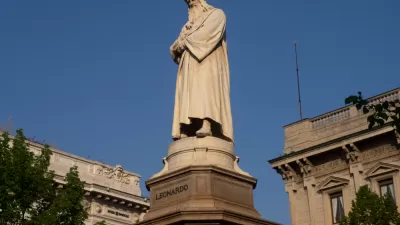The Economist looks at the looming battle between Congress and the Administration over whether to proceed now on transportation reauthorization or delay it 18 months, and concludes that the bottom line will be the funding mechanism.
Despite differences between House Committee on Transportation and Infrastructure Chair James Oberstar and DOT Secretary LaHood, there is hope that the new bill will be an improvement over the current one. Key, though, will be how to pay for it. Agreeing how to fill the broke Highway Trust Fund is central to the bill.
"Now a strategy is emerging at last. Mr. Oberstar would spend $450 billion on roads, bridges and mass transport, 38% above current levels, and devote $50 billion to high-speed rail.
Such ambitious plans, however, may have to be postponed. Mr. LaHood wants to extend the old transport bill by 18 months. Even without a new bill, there may be room for progress, says a hopeful James Corless of Transportation for America, a reform group. The transport secretary says he would send more money to metropolitan areas and use cost-benefit analyses to guide investment. The DoT is already encouraging plans to build housing near transport, expand access to buses, subways and bicycles, and reduce emissions in the process.
Still, a main question remains unanswered. The Highway Trust Fund will soon be empty. There is no consensus on how to fill it. The gas (petrol) tax, the main source of revenue for transport, has remained flat since 1993. Revenues have declined as travel has ebbed in the recession and cars have become more efficient. In the long term, congestion pricing is the best solution, but it could take years to adopt. In the meantime the Obama administration is loth to raise the gas tax. Siphoning money from general funds is an easy but unsustainable answer. There may be a new vision for transport, but it will never progress until someone is willing to pay for it."
Thanks to Bay Area Transportation News
FULL STORY: Ambitious plans for American transport run into reality

Trump Administration Could Effectively End Housing Voucher Program
Federal officials are eyeing major cuts to the Section 8 program that helps millions of low-income households pay rent.

Planetizen Federal Action Tracker
A weekly monitor of how Trump’s orders and actions are impacting planners and planning in America.

Ken Jennings Launches Transit Web Series
The Jeopardy champ wants you to ride public transit.

Crime Continues to Drop on Philly, San Francisco Transit Systems
SEPTA and BART both saw significant declines in violent crime in the first quarter of 2025.

How South LA Green Spaces Power Community Health and Hope
Green spaces like South L.A. Wetlands Park are helping South Los Angeles residents promote healthy lifestyles, build community, and advocate for improvements that reflect local needs in historically underserved neighborhoods.

Sacramento Plans ‘Quick-Build’ Road Safety Projects
The city wants to accelerate small-scale safety improvements that use low-cost equipment to make an impact at dangerous intersections.
Urban Design for Planners 1: Software Tools
This six-course series explores essential urban design concepts using open source software and equips planners with the tools they need to participate fully in the urban design process.
Planning for Universal Design
Learn the tools for implementing Universal Design in planning regulations.
Heyer Gruel & Associates PA
Ada County Highway District
Institute for Housing and Urban Development Studies (IHS)
City of Grandview
Harvard GSD Executive Education
Toledo-Lucas County Plan Commissions
Salt Lake City
NYU Wagner Graduate School of Public Service





























